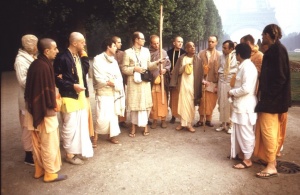SB 1.13.40: Difference between revisions
m (1 revision(s)) |
No edit summary |
||
| Line 1: | Line 1: | ||
{{info | {{info | ||
|speaker=King | |speaker=King Yudhiṣṭhira | ||
|listener= | |listener=Nārada Muni | ||
}} | }} | ||
[[Category:Srimad-Bhagavatam - Canto 01 Chapter 13]] | |||
[[Category:Bhagavatam Verses Spoken by Yudhisthira Maharaja - Vanisource|011340]] | |||
<div style="float:left">'''[[Srimad-Bhagavatam]] - [[SB 1|First Canto]] - [[SB 1.13: Dhrtarastra Quits Home|Chapter 13: Dhṛtarāṣṭra Quits Home]]'''</div> | |||
<div style="float:right">[[File:Go-previous.png|link=SB 1.13.39]] '''[[SB 1.13.39]] - [[SB 1.13.41]]''' [[File:Go-next.png|link=SB 1.13.41]]</div> | |||
{{CompareVersions|SB|1.13.40|SB 1965|SB 1972-77}} | |||
{{RandomImage}} | |||
==== TEXT 40 ==== | ==== TEXT 40 ==== | ||
<div class="verse"> | |||
<div | :karṇadhāra ivāpāre | ||
karṇadhāra ivāpāre | :bhagavān pāra-darśakaḥ | ||
bhagavān pāra-darśakaḥ | :athābabhāṣe bhagavān | ||
athābabhāṣe bhagavān | :nārado muni-sattamaḥ | ||
nārado muni-sattamaḥ | |||
</div> | </div> | ||
| Line 18: | Line 23: | ||
==== SYNONYMS ==== | ==== SYNONYMS ==== | ||
<div class="synonyms"> | |||
<div | ''karṇa-dhāraḥ''—captain of the ship; ''iva''—like; ''apāre''—in the extensive oceans; ''bhagavān''—representative of the Lord; ''pāra-darśakaḥ''—one who can give directions to the other side; ''atha''—thus; ''ābabhāṣe''—began to say; ''bhagavān''—the godly personality; ''nāradaḥ''—the great sage Nārada; ''muni-sat-tamaḥ''—the greatest among the devotee philosophers. | ||
karṇa- | |||
</div> | </div> | ||
| Line 26: | Line 30: | ||
==== TRANSLATION ==== | ==== TRANSLATION ==== | ||
<div class="translation"> | |||
<div | |||
You are like a captain of a ship in a great ocean and you can direct us to our destination. Thus addressed, the godly personality, Devarṣi Nārada, greatest of the philosopher devotees, began to speak. | You are like a captain of a ship in a great ocean and you can direct us to our destination. Thus addressed, the godly personality, Devarṣi Nārada, greatest of the philosopher devotees, began to speak. | ||
</div> | </div> | ||
| Line 34: | Line 37: | ||
==== PURPORT ==== | ==== PURPORT ==== | ||
<div class="purport"> | |||
There are different types of philosophers, and the greatest of all of them are those who have seen the Personality of Godhead and have surrendered themselves in the transcendental loving service of the Lord. Among all such pure devotees of the Lord, Devarṣi Nārada is the chief, and therefore he has been described herein as the greatest of all philosopher devotees. Unless one has become a sufficiently learned philosopher by hearing the ''Vedānta'' philosophy from a bona fide spiritual master, one cannot be a learned philosopher devotee. One must be very faithful, learned and renounced, otherwise one cannot be a pure devotee. A pure devotee of the Lord can give us direction towards the other end of nescience. Devarṣi Nārada used to visit the palace of Mahārāja Yudhiṣṭhira because the Pāṇḍavas were all pure devotees of the Lord, and the Devarṣi was always ready to give them good counsel whenever needed. | |||
</div> | |||
<div | |||
<div style="float:right; clear:both;">[[File:Go-previous.png|link=SB 1.13.39]] '''[[SB 1.13.39]] - [[SB 1.13.41]]''' [[File:Go-next.png|link=SB 1.13.41]]</div> | |||
</div> | __NOTOC__ | ||
__NOTOC__ | __NOEDITSECTION__ | ||
Revision as of 03:25, 2 May 2021

A.C. Bhaktivedanta Swami Prabhupada
TEXT 40
- karṇadhāra ivāpāre
- bhagavān pāra-darśakaḥ
- athābabhāṣe bhagavān
- nārado muni-sattamaḥ
SYNONYMS
karṇa-dhāraḥ—captain of the ship; iva—like; apāre—in the extensive oceans; bhagavān—representative of the Lord; pāra-darśakaḥ—one who can give directions to the other side; atha—thus; ābabhāṣe—began to say; bhagavān—the godly personality; nāradaḥ—the great sage Nārada; muni-sat-tamaḥ—the greatest among the devotee philosophers.
TRANSLATION
You are like a captain of a ship in a great ocean and you can direct us to our destination. Thus addressed, the godly personality, Devarṣi Nārada, greatest of the philosopher devotees, began to speak.
PURPORT
There are different types of philosophers, and the greatest of all of them are those who have seen the Personality of Godhead and have surrendered themselves in the transcendental loving service of the Lord. Among all such pure devotees of the Lord, Devarṣi Nārada is the chief, and therefore he has been described herein as the greatest of all philosopher devotees. Unless one has become a sufficiently learned philosopher by hearing the Vedānta philosophy from a bona fide spiritual master, one cannot be a learned philosopher devotee. One must be very faithful, learned and renounced, otherwise one cannot be a pure devotee. A pure devotee of the Lord can give us direction towards the other end of nescience. Devarṣi Nārada used to visit the palace of Mahārāja Yudhiṣṭhira because the Pāṇḍavas were all pure devotees of the Lord, and the Devarṣi was always ready to give them good counsel whenever needed.